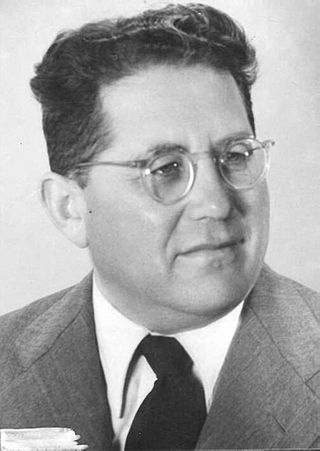
Ernst Waldfried Josef Wenzel Mach was a Moravian-born Austrian physicist and philosopher, who contributed to the physics of shock waves. The ratio of one's speed to that of sound is named the Mach number in his honour. As a philosopher of science, he was a major influence on logical positivism and American pragmatism. Through his criticism of Newton's theories of space and time, he foreshadowed Einstein's theory of relativity.

Friedrich Albert Moritz Schlick was a German philosopher, physicist, and the founding father of logical positivism and the Vienna Circle.

The Vienna Circle of Logical Empiricism was a group of elite philosophers and scientists drawn from the natural and social sciences, logic and mathematics who met regularly from 1924 to 1936 at the University of Vienna, chaired by Moritz Schlick. The Vienna Circle had a profound influence on 20th-century philosophy, especially philosophy of science and analytic philosophy.

Hans Hahn was an Austrian mathematician and philosopher who made contributions to functional analysis, topology, set theory, the calculus of variations, real analysis, and order theory. In philosophy he was among the main logical positivists of the Vienna Circle.
Johann "Hans" Nelböck was an Austrian former student and murderer of Moritz Schlick, the founder of the group of philosophers and scientists known as the Vienna Circle.
The Institute Vienna Circle (IVC) was founded in October 1991 as an international nonprofit organization dedicated to the work and influence of the Vienna Circle of Logical Empiricism. Since 2011 the IVC was established as a subunit (Department) of the Faculty of Philosophy and Education at the University of Vienna. In 2016 the title of the co-existing society was changed to "Vienna Circle Society" (VCS), which entertains a close co-operation with the IVC. The Institute’s founder and scientific director of the VCS is Friedrich Stadler, who serves as a permanent fellow of the IVC in parallel.

Victor Kraft was an Austrian philosopher. He is best known for being a member of the Vienna Circle.

Rose Rand was an Austrian-American logician and philosopher. She was a member of the Vienna Circle.

Martin Andreas Hainz is an Austrian philologist, theorist and philosopher. He has taught at several universities in Europe and the United States, among them the universities of Vienna, Timișoara and Iaşi. He is a member of the Northeastern Language Association (NEMLA). His main interests are contemporary Austrian philosophy and literature.

Egon Schweidler, was an Austrian physicist.

The Imperial Treasury at the Hofburg Palace in Vienna, Austria contains a valuable collection of secular and ecclesiastical treasures covering over a thousand years of European history. The entrance to the treasury is at the Schweizerhof, the oldest part of the palace, which was rebuilt in the sixteenth century in the Renaissance style under Holy Roman Emperor Ferdinand I. The Imperial Treasury is affiliated with the Kunsthistorisches Museum, and houses in 21 rooms a collection of rare treasures that were compiled by the Imperial House of Habsburg over the course of centuries, including the Imperial Crown, Orb, and Sceptre of Austria, and the Imperial Regalia of the Emperors and Kings of the Holy Roman Empire, including the Imperial Crown of the Holy Roman Empire.
Deborah Klimburg-Salter is an art historian and emeritus professor for non-European art history at the Department of Art History of the University of Vienna. She was also director of the research platform Center for Research and Documentation of Inner and South Asia (CIRDIS). Currently she directs the project "Cultural Formation and Transformation: Shahi Art and Architecture from Afghanistan to the Western Frontier at the Dawn of the Islamic Era" financed by the Austrian Science Fund (FWF) and dedicated to transdisciplinary research.

Josef Schächter was an Austrian rabbi, philosopher and member of the Vienna Circle from 1925 to 1936.
Nuno Maulide, born in 1979, is a Portuguese chemist, currently professor of organic chemistry at the University of Vienna.

Harald Grobner is an Austrian mathematician at the Faculty of Mathematics, University of Vienna. His research focuses on questions of algebra and number theory within the Langlands program.
Felix Czeike was an Austrian historian and popular educator. He was an author and partly also editor of numerous publications on the history of Vienna and was the director of the Wiener Stadt- und Landesarchiv. His main work is the six-volume Historische Lexikon Wien.
Edith Saurer was an Austrian historian, university professor at the University of Vienna, scientific author, and publisher. She is regarded as a central cofounder and advocate of feminist historiography in Austria. She received the Käthe Leichter Prize, Gabriele Possanner State Prize, and the Golden Medal for her services to the State of Vienna.
Tamara Scheer is an Austrian historian. Scheer studied history at the University of Vienna and achieved her doctorate in 2006 at the same university. Since then she taught and worked at several institutions: from 2010 to 2012 Post-Doc-Head of the Doctoral School and ÖAD-Fellow at Andrássy University Budapest, FWF-Hertha-Firnberg-Fellow at Ludwig Boltzmann Institute for Historical Social Science (2013-2017). Short-Term Fellowships brought her to Trinity College Dublin (2014), Czech Academy of Sciences (2016) European University Institut Florence (2017/18), and the University of Oslo (2018).
Fritz Walden, real name Friedrich Drobilitsch, also Fritz Drobilitsch-Walden and Franz Drobilitsch, was an Austrian publicist, author and cultural editor as well as film, literature, music and theatre critic.










